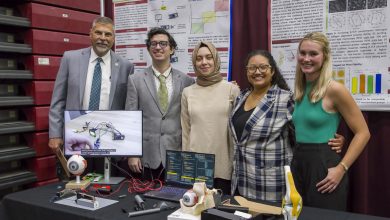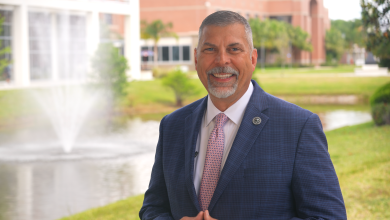Jon Shenker: Unforgiving Marine Biology Fun
via the Florida Tech Today
by Andy McIlwraith
Marine biology is not for you. Unless it is.
The smell is jarring, a pungent blend of decaying leaves and rotten eggs, as a dozen or so fresh-faced teenagers descend into the warm, still water of a mangrove swamp at the edge of the Indian River Lagoon, sticky black silt oozing between their toes.
Most smile eagerly, as if this is some sort of lark—a ripe, guess-what-I-did-today survival story they’ll eagerly share later with friends. A few cringe with varying degrees of horror, shock and dismay at their unspeakable discomfort.
No, these are not fraternity pledges. They are first-year marine biology students under the tutelage of professor Jon Shenker, who’s been subjecting Florida Tech freshmen to baptism by muck for more than 20 years.
“Hey, I want students to learn early on that marine biology is quite often a wet, muddy, uncomfortable enterprise,” he says, his whitening beard framing a slight grin. “It’s not all ‘Shark Week,’ Jacques Cousteau and ‘Flipper.’ We often wade around up to our necks in slime.”
But it’s not slime for slime’s sake. Shenker takes his students to the mangrove swamps because these ecosystems are prime nursery habitats for juvenile tarpon. Studying the early life history of the Silver King—from egg to larva to juvenile—is one of his specialties.
It’s also a great way to introduce students to the profession. “I do this to get students to start thinking as scientists in a quantitative fashion. Being a fish biologist, I can’t think of a better thing to do than give them a seine net and have them collect and begin to analyze data,” he says.
During this initiation, many of Shenker’s students fall in love with getting dirty in the name of science. Others quickly realize a preference for more climate-controlled laboratory work. “It’s important for students to learn the reality of marine biology early on,” he says. “We expose them to as many research experiences as possible. As a result, many publish as undergraduates.”
Over the years, Shenker has introduced students to the Australian outback, coral reefs in the Bahamas, the St. Johns River, Florida’s Everglades and the open waters of the Northern Pacific, where he says conducting research while being rocked to and fro by 10- to 12-foot swells is “just a normal day.”
Some of what Shenker asks of his students is borderline reality TV material. One example: He plans to have the volunteers currently assisting him in his lionfish research—which focuses on how to impede the invasive species’ proliferation—taste the spiny, venomous creature’s roe.
“We want to determine what qualities make lionfish so resistant to predation, what makes the species so good at spreading. I expect one of the factors is that their gelatinous egg mass tastes horrible,” he explains. “First, we have to get them to spawn in captivity. Then, we’ll do our taste test.”
Shenker doesn’t pull punches when it comes to the prickly aspects of pursuing marine biology as a profession. He happily describes it as a tough way to make a living—a modest one, he cracks—that requires dedication and determination. At the same time, it’s obvious he takes great joy in what he does.
“It really is a tremendous career because you get to do things that very few other people will get a chance to do,” he assures. “It’s a chance to be an explorer and a scientist, as well as an advocate for the restoration of habitats and fishery resources. I always communicate this to future marine biologists.”
Shenker’s passion for the ocean and marine life took hold in him at age 4, when his father took him fishing for the first time off a dock in Long Island, N.Y. He caught a perch and witnessed a neighbor landing a striped bass. “That was it. That did it to me. Flipped a little switch in my brain,” he says. “I was hooked.”
Today, Shenker shows no signs of becoming “un-hooked.” Asked how he sees himself after a lifetime of marine research, education and advocacy, Shenker quips: “Tired.” Then, after a moment, he adds: “I see somebody who really enjoys doing what he does.”
Marine biology may not be for everyone. But for Shenker, it’s a great way of life.
Jon Shenker is an internationally known fish biologist who, during his 22-year career at Florida Tech, has directed over $1.9 million in sponsored research, published 35 papers, and graduated nearly 50 master’s and doctoral students from his lab. Today, his students are working with the Florida Marine Fisheries Enhancement Initiative to rebuild wild fishery stocks, analyzing the historical distribution of snapper spawning stocks along Florida’s east coast, and conducting research on larval fish production, aquaculture and ecology. Shenker holds an informal world record in tarpon fishing—for catching the smallest ever. It was a quarter inch long.






